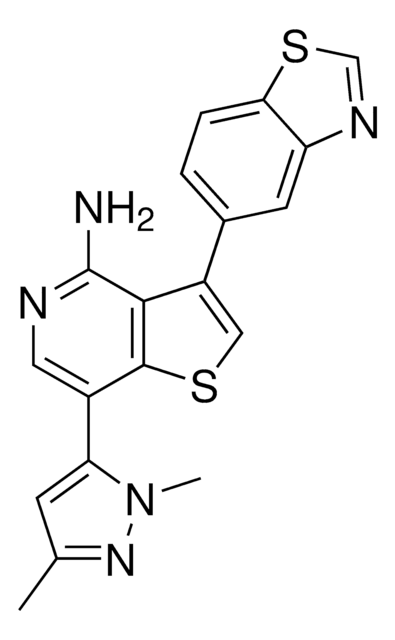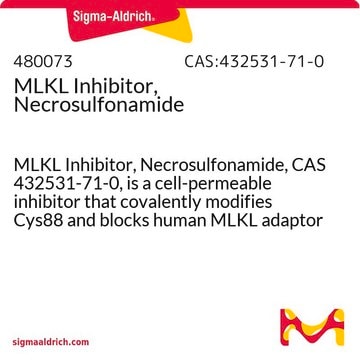5.30389
GSK′872
≥98% (HPLC), solid, RIPK3 inhibitor, Calbiochem®
Synonyme(s) :
RIPK3 Inhibitor, GSK′872, N-(6-(Isopropylsulfonyl)quinolin-4-yl)benzo[d]thiazol-5-amine, RIP3 Kinase Inhibitor I, Receptor-Interacting Protein Kinase 3 Inhibitor I, GSK-872, Necrosis Inhibitor V, RIPK3 Inhibitor I
About This Item
Produits recommandés
product name
RIPK3 Inhibitor, GSK′872,
Pureté
≥98% (HPLC)
Niveau de qualité
Forme
solid
Fabricant/nom de marque
Calbiochem®
Conditions de stockage
OK to freeze
protect from light
Couleur
yellow
Solubilité
DMSO: 100 mg/mL
Température de stockage
2-8°C
Description générale
Actions biochimiques/physiologiques
RIP3 Kinase
Conditionnement
Avertissement
Reconstitution
Autres remarques
Informations légales
Code de la classe de stockage
11 - Combustible Solids
Classe de danger pour l'eau (WGK)
WGK 3
Point d'éclair (°F)
Not applicable
Point d'éclair (°C)
Not applicable
Certificats d'analyse (COA)
Recherchez un Certificats d'analyse (COA) en saisissant le numéro de lot du produit. Les numéros de lot figurent sur l'étiquette du produit après les mots "Lot" ou "Batch".
Déjà en possession de ce produit ?
Retrouvez la documentation relative aux produits que vous avez récemment achetés dans la Bibliothèque de documents.
Notre équipe de scientifiques dispose d'une expérience dans tous les secteurs de la recherche, notamment en sciences de la vie, science des matériaux, synthèse chimique, chromatographie, analyse et dans de nombreux autres domaines..
Contacter notre Service technique








